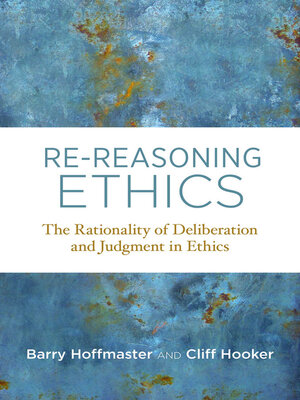Re-Reasoning Ethics
ebook ∣ The Rationality of Deliberation and Judgment in Ethics · Basic Bioethics
By Barry Hoffmaster

Sign up to save your library
With an OverDrive account, you can save your favorite libraries for at-a-glance information about availability. Find out more about OverDrive accounts.
Find this title in Libby, the library reading app by OverDrive.



Search for a digital library with this title
Title found at these libraries:
| Library Name | Distance |
|---|---|
| Loading... |
In Re-Reasoning Ethics, Barry Hoffmaster and Cliff Hooker enhance and empower ethics by adopting a non-formal paradigm of rational deliberation as intelligent problem-solving and a complementary non-formal paradigm of ethical deliberation as problem-solving design to promote human flourishing. The non-formal conception of reason produces broader and richer ethical understandings of human situations, not the simple, constrained depictions provided by moral theories and their logical applications in medical ethics and bioethics. Instead, it delivers and vindicates the moral judgment that complex, contextual, and dynamic situations require.
Hoffmaster and Hooker demonstrate how this more expansive rationality operates with examples, first in science and then in ethics. Non-formal reason brings rationality not just to the empirical world of science but also to the empirical realities of human lives. Among the many real cases they present is that of how women at risk of having children with genetic conditions decide whether to try to become pregnant. These women do not apply the formal principle of maximizing expected utility (as advised by genetic counselors) and instead imagine scenarios of what their lives could be like with an affected child and assess whether they could accept the worst of these scenarios.
Hoffmaster and Hooker explain how moral compromise and a liberated, extended, and enriched reflective equilibrium expand and augment rational ethical deliberation and how that deliberation can rationally design ethical practices, institutions, and policies.







